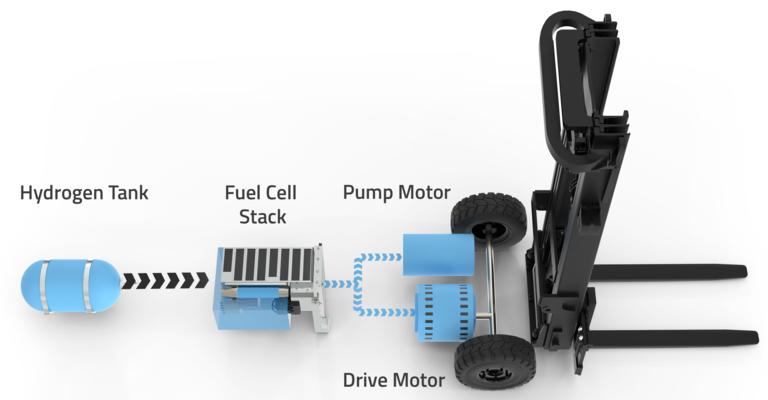Everything you need to know about fuel cell forklift trucks
Common questions about fuel cells
Fuel cell trucks are forklifts that use hydrogen for power, rather than a traditional lead-acid battery. The use of fuel cell trucks is growing as companies embrace cleaner and more renewable energy solutions.
A fuel cell is a device that generates electricity through a chemical reaction. It combines hydrogen fuel with oxygen to produce an electric current. It is similar to a traditional battery in that it creates an electrochemical reaction as long as fuel is available.
A fuel cell converts hydrogen into water with the help of oxygen from the air. During this chemical reaction, electrical energy is released. This energy is harnessed to drive the electric motors.
There are several methods for producing hydrogen. One common method is steam reforming. Another is electrolysis, which is considered the cleanest process. This works by running a current through water, splitting it into hydrogen and oxygen.
If the electricity comes from renewable energy sources, it is called ‘green hydrogen’. This is particularly environmentally friendly and can result in net-zero-emissions power.
The advantages of fuel cell technology include:
- Emissions-free operation. Distilled water is the only waste product
- Refuelling takes only 2-3 minutes and there is no need for battery changes, increasing the utilisation rates of trucks
- Flexible fuelling: ‘topping-up’ is possible without harming the battery life cycle
- No investment in cargo space or ventilation systems needed, giving you more space for your core operations
- No handling of toxic chemicals like acid or lead
- CO2 neutral when green hydrogen is used
- Fuel cells have high energy density: they can store and supply more energy per unit of volume
- Easy to store and transport
- No performance loss when the tank isn’t full and during use
- Cells have low maintenance and long service life
- Can be retrofitted
- Can be used in temperatures ranging from -30°C to 40°C, making fuel cell perfect for cold store usage
- Refuelling can be done both outdoors and indoors
Fuel cell is beneficial for large or complex fleets with multiple shifts where battery exchange is normally needed. If this describes your operation, you should look further into the benefits of fuel cell technology.

